Welcome to our interactive guide on maintaining the security of your WordPress website. It’s important to keep in mind that security is the ultimate basis for a healthy digital presence in today’s ever-changing online environment, where creativity and innovation flourish every day. Let’s take a closer look at the importance of security and the steps you can take to protect your WordPress site like a pro.
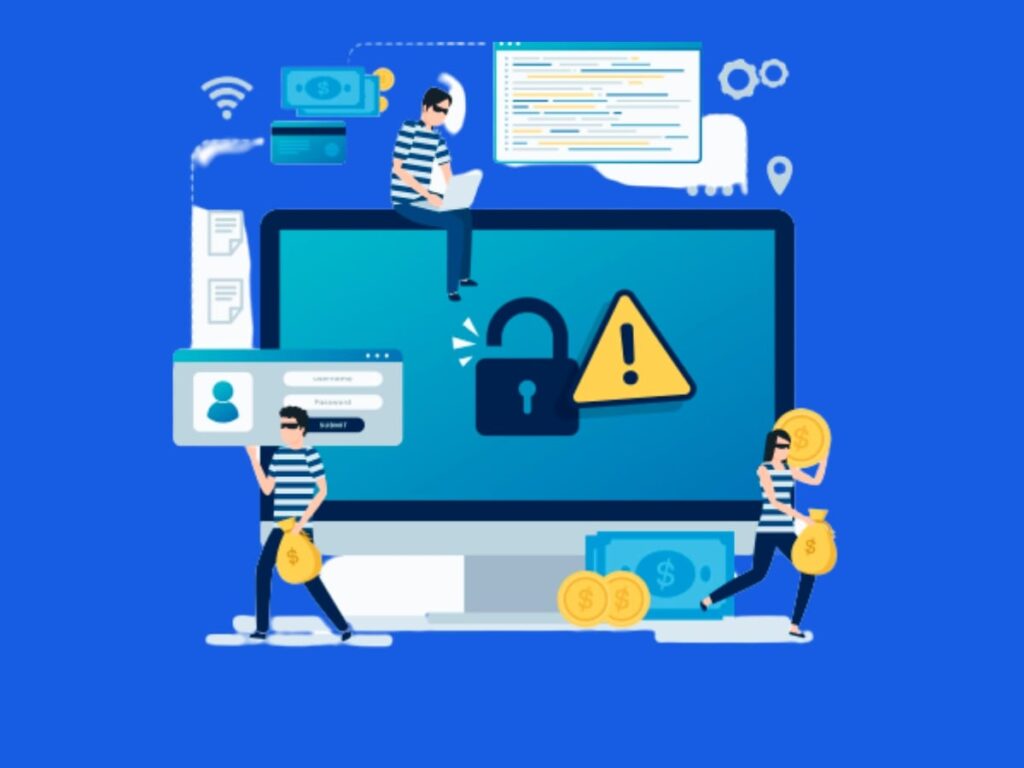
Table of Contents
ToggleWhy is website security important?
Consider your website to be your online home. Just like you wouldn’t want anyone breaking into your house, you don’t want bad people messing with your website either. It’s like having a shield that stops hackers from stealing your data. When your visitors see your site is secure, they feel comfortable and stay longer on your website. Additionally, a secure website shows that you’re responsible and trustworthy, which is very important in the online world. Keeping your website safe therefore means that your website is a comfortable and reliable place for all your visitors.
How to Keep Your WordPress Site Safe:
Use complex passwords and usernames
Have you ever heard of a clever technique known as a “brute force attack”?It is a type of cyberattack in which hackers use different user names and passwords in a second by utilizing a super-fast computer. Their primary goal is to obtain your confidential credentials forcibly and steal your sensitive information. The default username for a WordPress website is “Admin,” which is an easy one to guess.
So, you must change that to something unique and you should also use a complex combination of passwords to make your website secure.
WordPress backup

Backing up your WordPress site is essential for security and peace of mind. It creates a copy of all of your website’s data, including your posts, pages, images, and plugins, and stores it in a safe place. This way, if anything happens to your website, such as a hack or a crash, you can restore it from the backup.
There are two main ways to back up your WordPress site:
Manually: You can manually download a copy of your website’s files and database and store them on your computer or in the cloud.
Automatically: You can use a WordPress backup plugin to automatically create and store backups of your website regularly.
If you’re not comfortable backing up your website manually, I recommend using a WordPress backup plugin. There are many great plugins available, such as UpdraftPlus and BackWPup. These plugins make it easy to create and store backups, and they can even schedule backups to run automatically.
No matter which method you choose, backing up your WordPress site is an essential step in securing your website and protecting your data. By taking the time to back up your site regularly, you can rest assured that you’ll be able to restore it if anything goes wrong.
Keep WordPress core, themes, and plugins up to date
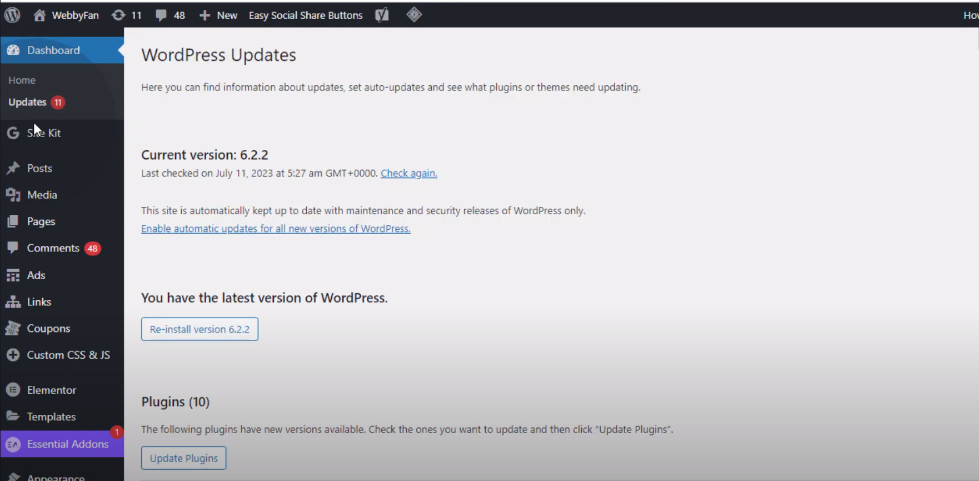
A secure website is maintained properly. Regularly updating your WordPress core, themes, and plugins is your first line of defense. It is easy for hackers to attack an outdated version. So to limit the security threats, it is necessary to update all plugins, themes, and WordPress core.
Limit login attempts
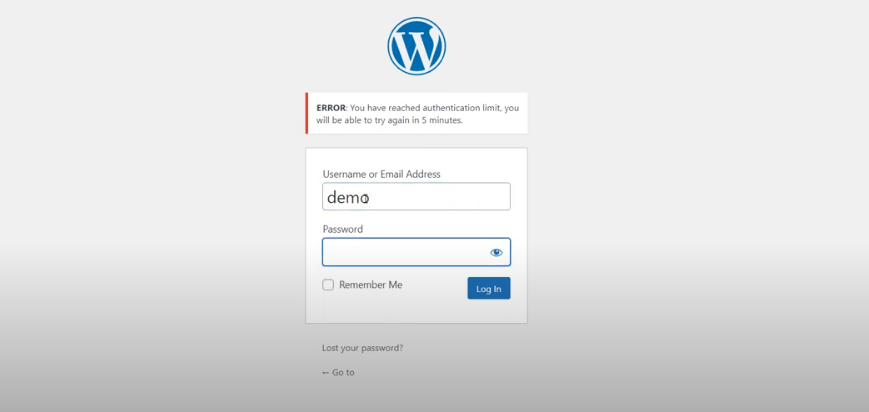
You can safeguard your WordPress login page in various ways, but limiting login attempts is a straightforward and popular method. By default, WordPress allows unlimited login attempts, which can expose your site to automated brute-force attacks. This allows hackers to try numerous password combinations to gain unauthorized access.
Enable two-factor authentication
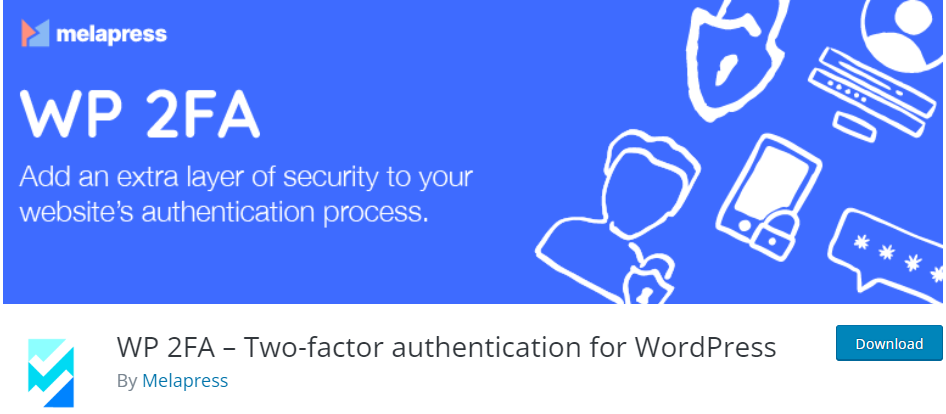
Two-factor authentication (2FA) is a security measure that adds an extra layer of protection to your WordPress login process. With 2FA, you need to provide two different forms of identification to log in: your username and password, and a one-time code that is sent to your phone or email. This makes it much more difficult for hackers to gain unauthorized access to your website.
Here are some of the benefits of enabling 2FA on your WordPress website:
Increased security: 2FA significantly reduces the risk of unauthorized access to your website, as hackers would need to have both your password and your phone or email to log in.
Peace of mind: Knowing that your website is protected by 2FA can give you peace of mind, knowing that your data is safe from unauthorized access.
Easy to set up: Most WordPress plugins make it easy to set up 2FA, and once it is set up, you will barely notice it.
If you are serious about protecting your WordPress website, I highly recommend enabling 2FA. It is a simple and effective way to add an extra layer of security to your website and protect your data from unauthorized access.
Scan WordPress for Malware Frequently
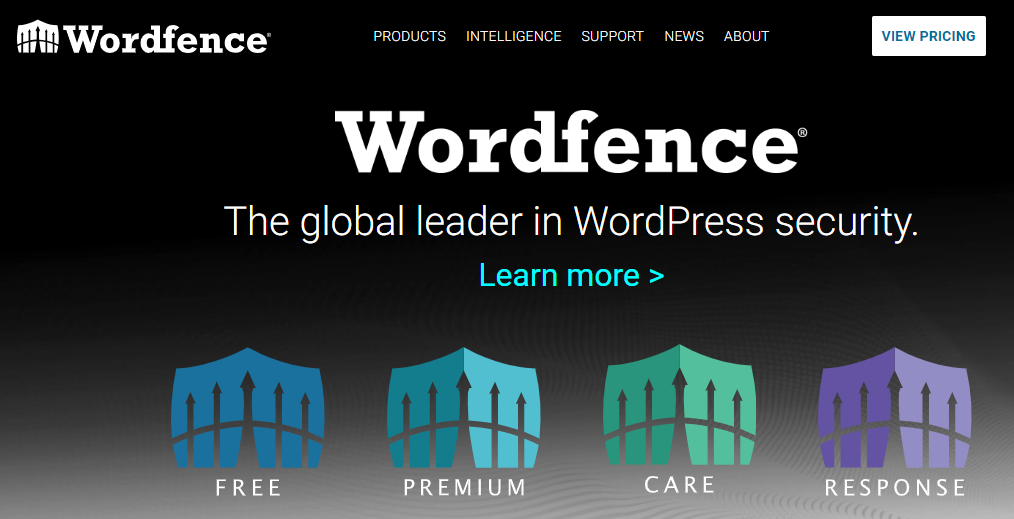
Scanning your WordPress website for malware regularly is essential for keeping it secure. Even if you take all the other necessary security measures, such as using strong passwords and keeping your software up to date, your website can still be infected with malware. This is because malware is constantly being created and updated, and it can be difficult to keep up with the latest threats.
There are several ways to scan your WordPress website for malware. You can use a WordPress security plugin, such as Wordfence or Sucuri, or you can use a dedicated malware scanning tool. If you use a WordPress security plugin, make sure that it is up to date and that you have enabled the malware scanning features.
When scanning your website for malware, it is important to be thorough. You should scan all of your website’s files and folders, including your plugins, themes, and media files. You should also scan your website’s database.
If you find any malware on your website, it is important to remove it immediately. You can usually remove malware by using a malware removal tool. However, in some cases, you may need to restore your website from a backup.
Protect your WordPress website from malware infection by scanning it regularly.
Use a security plugin
Enhance your WordPress security with powerful security plugins. Safeguard your website from attacks by utilizing plugins that conduct thorough scans for vulnerabilities, block malicious traffic, and offer website cleanup if compromised. These tools provide proactive defense, ensuring a robust shield against potential threats. Explore the diverse range of security plugins available to fortify your WordPress site and maintain its integrity. Strengthening your defenses through these plugins not only protects your website but also provides peace of mind, allowing you to focus on your content and business without the constant worry of potential security breaches.
Be careful about the plugins you install
When selecting plugins for your WordPress website, it is crucial to prioritize safety and compatibility. Always download plugins from trusted sources, such as the official WordPress plugin repository, to minimize the risk of malware or security vulnerabilities. Before installing any plugin, thoroughly review its user ratings, reviews, and support forum discussions to gauge its reliability and identify any potential issues. Additionally, verify that the plugin is compatible with your current WordPress version to prevent conflicts or unexpected behavior.
Remember, safeguarding your WordPress website is an ongoing process, and vigilance in plugin selection is a key aspect of maintaining a secure and stable online presence.
Use a web application firewall (WAF)

A WAF acts as a security guard for your website, intercepting and scrutinizing incoming traffic to block malicious attempts. It safeguards your website from a variety of cyber threats, including SQL injection and cross-site scripting (XSS), which can compromise your site’s integrity and steal sensitive data.
By implementing a WAF, you can significantly enhance your website’s security posture and prevent unauthorized access or data breaches. Popular WAF options for WordPress include Cloudflare and ModSecurity.
Rename the wp-login.php file
The wp-login.php file is the default login page for WordPress, making it a prime target for hackers who seek to exploit vulnerabilities. Renaming this file serves as an additional security measure by obfuscating its location and making it more difficult for hackers to identify and attack.
Use a secure hosting provider
Hosting provider plays an important role in your website’s security, making it crucial to select a reputable company with a proven track record of safeguarding customer data. A reliable hosting provider should offer a comprehensive suite of security features, including firewalls, intrusion detection systems, and malware scanning tools, to effectively shield your website from cyberattacks.
Moreover, opting for a hosting provider that employs experienced security experts and adheres to industry best practices further reinforces the protection of your website. By entrusting your website’s hosting to a trustworthy provider, you can rest assured that your valuable information remains secure and protected from potential threats.
Keep your WordPress installation secret
To maintain the integrity of your WordPress website, it’s crucial to safeguard your login credentials. Avoid disclosing your username and password to anyone, as this significantly reduces the risk of unauthorized access by malicious actors. By keeping your login information private, you can effectively protect your website from potential security breaches and maintain its overall security posture.
FAQs
Website security is vital to protect your online home from unauthorized access and cyber threats. Just as you wouldn’t want intruders in your house, securing your website with measures like a shield against hackers ensures data safety and builds trust with visitors.
Using unique usernames and intricate passwords deters cyber threats like brute force attacks. Changing the default “Admin” username and employing complex passwords strengthens your website’s defense, preventing unauthorized access.
Regular backups create a secure copy of your website’s data, allowing you to restore it if compromised. Whether done manually or automatically using plugins like UpdraftPlus, backups ensure your site’s recovery in case of hacks or crashes.
2FA adds an extra layer of security to your login process, requiring both a password and a one-time code sent to your phone or email. It significantly reduces the risk of unauthorized access, providing increased security and peace of mind.
Regular malware scans with plugins like Wordfence or Sucuri help detect and remove potential threats. Even with strong passwords and updates, malware can still infect your site, making frequent scans essential for a secure WordPress website.